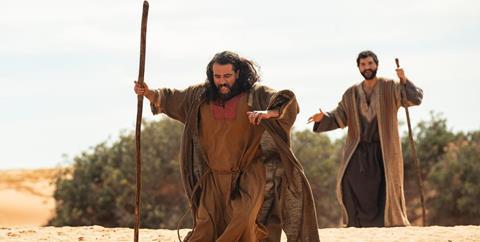Produced by the team behind The Chosen, this comedy series based on the Exodus is being released to YouTube. It’s already racked up 2 millions views since piloting online last year, but can The Promised Land really work? Christian and sit-com writer Paul Kerensa gives his view

“Okay,” says Aaron. “Just tell me when you guys are gonna start. Oh! You’re going? Okay. Hi! I mean Shalom…”
Moses’ brother opens The Promised Land’s pilot episode in typical mockumentary style: all shaky camera, zoom-ins and interviews to just off-camera. This is Modern Family with an ancient tribe; another day at The Office, except the workplace is the Exodus.
After telling us of the “crazy trip so far”, reassuring us (and himself) that they’ll “reach the Promised Land in no time”, a spear sails past Aaron’s head. They say a good sitcom traps characters, chases them, then throws stones them. That almost happens very swiftly in this new comedy show, which has gained over half a million YouTube views in a month.
But lest you think thou shalt not turn the Exodus into a comedy, consider the pedigree of the show’s creator. Writer/director Mitch Hudson is assistant director on The Chosen, the smash-hit biblical retelling now on its fourth season. But where The Chosen is a lavish drama, The Promised Land is a tongue-in-cheek parody, set in ancient times but with a present-day style familiar to any modern sitcom fans.
As a sitcom-writer of faith myself, I naturally side with the show’s intention. If Charlton Heston and VeggieTales can retell this tale, why can’t sitcom? Humour (or ‘humor’, if I were to humour the American programme-makers) is human. Leaning into the biblical text, the sitcom finds absurd but relatable characterful moments.
So rather than show the epic parting of the Red Sea, a confused Egyptian soldier wades out of it. There’s sibling rivalry from overlooked musical prodigy Miriam: “the baby my mother pushed down a river became a political revolutionary, so now I get to take notes while the men are talking.”
the greatest story ever told can be retold with joy

Big issues become more palatable when comedy sweetens the pill, and as the old adage goes, if they’re laughing they’re listening.
The Old Testament has moments ripe for mirth, separated by thousands of years. So I appreciated Moses’ attitude of gratitude for the famous heavenly bread: “I agree manna can be very bland, but you must remember it is a gift, it is a blessing from God – and it is very good for your health.”
After the Israelites applaud, Moses continues to deliberate on their absurd complaints, from growths on feet to a 14 year-old who won’t leave home.
Will some viewers be offended? Perhaps. But perceived offence doesn’t mean a story shouldn’t be told. It may simply not be for you – though I hope it is.
Jesus used humour in the Sermon on the Mount, with exaggerating imagery on removing planks from our own eyes before the speck from those of others. His audience of field-workers, fishermen and carpenters connected with metaphors of sowing, fishing and over-sized planks.
Today our lives are different. Given our TV viewing habits, let’s use sitcoms to retell such tales too.
Hudson plans to make at least 40 more episodes (ah, the US sitcom… in Britain we’d be glad to make twelve episodes, one for each disciple). If he continues in the mould of the pilot, I’ll be watching. The empathetic portrayal bridges a gap between us and these millennia-old characters, showing that comedy isn’t just to be laughed at.
The poet Christopher Fry once noted, “Comedy is an escape, not from truth but from despair; a narrow escape into faith.” I hope that productions like this demonstrate just that – that the greatest story ever told can be retold with joy.
The ten commandments might be set in stone, but the way we retell the story isn’t.
The Promised Land episodes 1 and 2 are available to watch on YouTube






































No comments yet